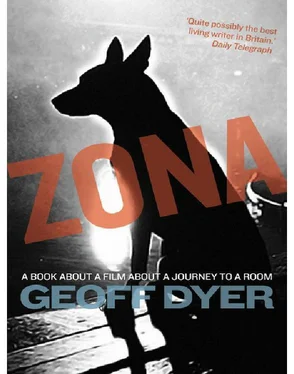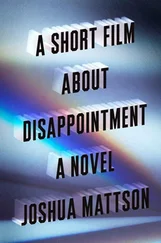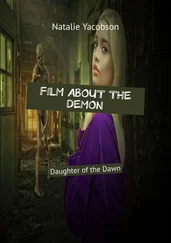In his poem ‘The Movies’, Billy Collins says he’s in the mood to watch a movie in which ‘someone embarks on a long journey, / a movie with the promise of danger.’ I like movies like that too, whether the journey is by boat ( Apocalypse Now, Deliverance ), train ( Von Ryan’s Express ) or car (take your pick). The idea of the road movie is almost tautologous in that all movies are — or should be — journeys, it’s just that some of them are so tedious you’d rather be on a bus from Oxford to London. Stalker is a literal journey that is also a journey into cinematic space and — in tandem — into time.
Collins doesn’t care what dangers are encountered in the film he’s watching since he will just be sitting there, watching. So they’re our representatives, these three middle-aged men, sitting there watching, still and still moving, while the endless grey-black imagery slides past their eyes and into their heads. This long tracking sequence, following the trolley as it clanks and clangs along, is the most straightforward journey imaginable— horizontal, flat, right to left, in a straight line — and full of all the promised wonder of cinema. That’s what we are being sold in the trailers that precede what used to be called the ‘feature presentation’. Unfortunately this has become some of the most debased wonder in the history of the earth. It means explosions, historical epics in which the outcome of the Battle of Hastings is reversed by the arcane CGI prowess of Merlin the Magician, it means five-year-old children turning suddenly into snarling devils, it means wrecking cars and reckless driving, it means a lot of noise, it means that I have to time my arrival carefully (twenty minutes at least) after the advertised programme time if I am to avoid all this stuff which, if one were exposed to it for the full hour and a half, would cause one’s capacity for discernment to drop by fifty percent (or, conversely, one’s ability to tolerate stuff like this to increase a hundredfold). It means sitting there shaking one’s middle-aged head; it means that one is wary about going to the cinema. It means that there are more and more things on the street, in shops, on-screen and on telly from which one has to avert one’s ears and eyes. With television I have my strict rule, a rule applying to Jeremy Clarkson, Jonathan Ross, Russell Brand, Graham Norton and a whole bunch of others whose names I don’t even know: I won’t have these people in the house. It’s not— as Stalker claimed — that all the world’s a prison; it’s just that a lot of what’s being shown on the world’s screens— televisions, cinemas, computers — is fit only for morons. Which is another reason why, in the long years since I first saw Stalker, I am as badly in need of the Zone and its wonders as any of the three men on the trolley as they sit there and the blurry landscape clangs past. The Zone is a place of uncompromised and unblemished value. It is one of the few territories left — possibly the only one — where the rights to Top Gear have not been sold: a place of refuge and sanctuary. A sanctuary, also, from cliché. That’s another of Tarkovsky’s virtues: an absolute freedom from cliché in a medium where clichés are not only tolerated but, in the form of unquestioning adherence to convention, expected. There are no clichés in Tarkovsky: no clichés of plot, of character, of framing, no clichés of music to underline the emotional meaning of a scene (or, as is more usually the case, to compensate or make good for an emotional meaning that would be absent were it not for the music). Actually, we need to qualify this slightly: there are no one else’s clichés in Tarkovsky. By the time of his final films, Nostalghia and The Sacrifice, however, he is reliant both conceptually and incrementally on Tarkovskyan cliché. Bergman said that, towards the end, Tarkovsky ‘began to make films that copied Tarkovsky.’ Wim Wenders felt exactly the same way about Nostalghia, that Tarkovsky was ‘using some of his typical narrative devices and shots as if they were between quotation marks.’ 13The guru became his own most devoted disciple.
We are in no hurry for this sequence to be over with, partly because it’s difficult to keep track of how long it lasts. Writer’s appearing to nod off suggests that, on this most linear of journeys, we are drifting into nonlinear time, are entering dream-time, but a dream-time where everything, every treasured detail is anchored firmly in the real and the now. This is not like the flashing psychedelic rhetoric—’Beyond the Infinite’—of the closing phase of 2001; this is strictly within the finite; it’s just impossible to say how long this finitude might extend. We never know when we’re going to die, we learn in Solaris, and because of that we are, at any one moment, immortal. I read Stanislaw Lem’s novel to see if that line was in the book or if it was something added by Tarkovsky. As far as I could tell — I skimmed — it wasn’t there, but years later I came across a similar sentiment in a poem by Auden: ‘Happy the hare at morning for he cannot know the waking hunter’s thoughts.’ What are their thoughts, the thoughts of these three men, as they travel into the Zone? Professor and Writer are thinking — wondering — exactly the same thing that we are, the question we asked as children on every journey with our parents: Are we there yet? Is this the Zone? Is this it? That, perhaps, is a question that can be answered only by the questioner, when he stops asking it. We are in the Zone when we believe we are there. The blurred landscape slips and clangs past. What we are seeing may be the external representation of the dream-flecked remains of Writer’s sleep, a sleep littered with booze-blurred memories of things he has seen a few minutes or hours earlier: abandoned buildings, discarded metals, the man-made poised to return to the natural. Is anything especially worthy of our attention? Everything is, or may be.
IT LASTS LONG ENOUGH, this sequence (a sequence one remembers as a single take, though it actually consists of five), to lull us into a kind of trance. There then occurs one of the miracles of cinema, one of several miracles in a film about an allegedly miraculous place. It’s not a jump cut or fade but suddenly and gently — the clanging and echoey clank of the music and trolley are still on the sound track — unambiguously, we’re in colour and in the Zone. 14You can watch the trolley car sequence again and again, can refuse to succumb to its hypnotic monotony, and you can never predict where it will come, this moment of subtle and absolute transition. Camera and trolley continue clanking forward for a few moments and then come to a halt. The camera pauses and moves back.
We are there. We are in the Zone.
It is every bit as lovely as Stalker claims — and, at the same time, quite ordinary. The air is full of the sound of birds, of wind in the trees, running water. Mist, muted greens. Weeds and plants swaying in the breeze. The tangled wires of a tilted telegraph pole. The rusting remains of a car. We are in another world that is no more than this world perceived with unprecedented attentiveness. Landscapes like this had been seen before Tarkovsky but — I don’t know how else to put it — their beingness had not been seen in this way. Tarkovsky reconfigured the world, brought this landscape — this way of seeing the world — into existence. Many forms of landscape depend on a particular artist, or writer or artistic movement to render them beautiful, to make the rest of us see what has always been there (as the romantics did for mountains, or John C. Van Dyke for the deserts of the American West). But it’s not only the unchanging, eternal, natural world that needs to be mediated in this way. Walker Evans opened our eyes — Stalker himself will soon use that very phrase of his own teacher and guide — to the sagging shacks, wrecked cars and fading signs of America in the thirties. To that extent Evans anticipated Bresson’s reminder to himself, in Notes on the Cinematographer: ‘Make visible what, without you, might perhaps never have been seen.’ A little later Bresson added a mediumspecific twist to this ambition: ‘Quality of a new world which none of the existing arts allowed to be imagined.’ Two related questions, then: would we regard this landscape of fields, abandoned cars, tilted telegraph poles and trees as beautiful without Tarkovsky? And could it have been brought into existence by any medium other than film?
Читать дальше












